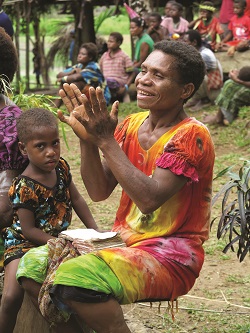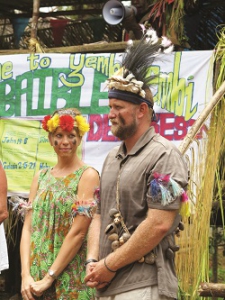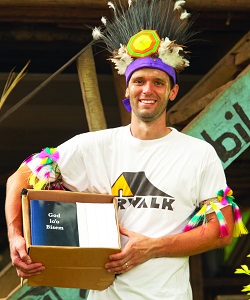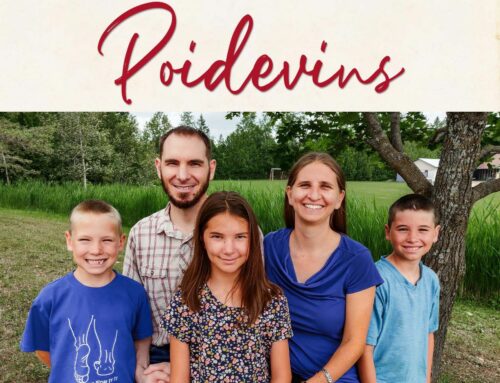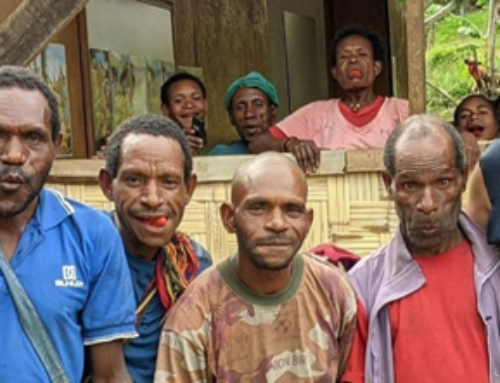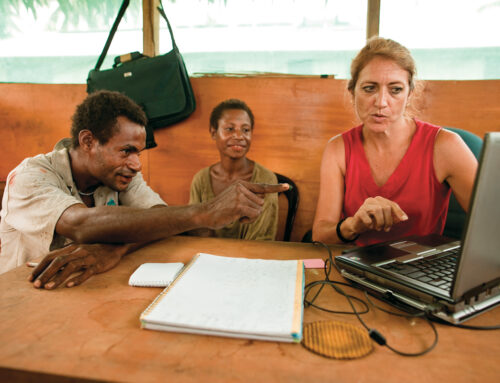Missionaries hear that all the time. Yet, once upon a time, they were just regular people with regular jobs like anyone else. Brooks Buser was a finance manager in San Diego, California. Terry Reed was a builder in Charleston,South Carolina. Darcy Berglund flunked high school typing class. And Marg Jank admits, “I’m not known for being a great student of anything!”
But now they all have something in common. They’ve translated the New Testament into a tribal language.
So how could such a drastic change take place in their lives? And why?
Brooks Buser’s story answers those questions.
He was on track with the American dream
Brooks was going places — literally. After working his way up to finance manager of a company in San Diego, business took him traveling through Europe. Back home, he and his wife Nina moved into a sweet little apartment, picked out a cute car, and were thoroughly enjoying life in sunny California.
Then an innocent trip back to visit Brooks’ family changed everything.
Brooks grew up in a village in Papua New Guinea. Walking those same trails again and seeing the tribal people, he and Nina’s hearts were stirred for others who still needed the Gospel message.
Brooks returned to California and put in his three-month notice. He and his wife had discovered something much bigger than the American dream — the Yembiyembi nightmare.
They were trapped in an animistic nightmare
What if you believed everything in your world was out to get you — both the animate and inanimate objects? What if you believed the spirit of every rock, tree, sweet potato, dream, animal and person was just waiting to harm you — unless you could “turn the tables” on them?
This is the fearful, vengeful nightmare tribal people never wake up from.
It drives the animist to continually perform rituals, sacrifices and magic spells in hopes of protecting his life, health, garden and future. He believes that if he ever stops, these spirits will quickly engulf his existence and snuff it out for good. Every sickness, death, injury or bad crop proves to him it’s true.
But what started this living nightmare? And what keeps it going?
They believed what their ancestors told them
Stories. Stories passed down through the generations brought animism to life and keeps it going. Stories told around the fire. Stories told on hunting trips. Stories told at ceremonies. Stories told while working in the garden. And each telling breathes new “life” and “truth” into the terrifying cycle that breeds suspicion, fear, revenge and death.
Animists believe these stories simply because they trust their ancestors and have no reason not to believe them. Truth is assumed because of the source — and not having anything else to compare it to.
Then one day, someone like Brooks Buser strolls unexpectedly into their nightmare — and challenges everything they’ve ever known.
The story that needed to be translated
Brooks and his teammates offered the Yembiyembi people a new story — a story so powerful and so important it had not been left to oral chance. Instead, it had been carefully written down so it would remain true and unchanged forever. Now he volunteered to write this same story down in their language. That decision would prove pivotal.
When Brooks left his high-profile job as a finance manager in California, he knowingly left all its benefits and perks behind. What he couldn’t have imagined was the far-reaching benefits attached to becoming a Bible translator guided by NTM’s goals and values. It would impact his life and the Yembiyembi people forever.
Goal: A translation that communicates God’s heart
Isaiah 55:11 says, “So shall My word be that goes forth from My mouth; It shall not return to Me void, But it shall accomplish what I please …”
Only God’s Word has the power to accomplish God’s purposes. People’s well-intentioned words carry no promise. A Bible translation must clearly and accurately communicate what God intended — what He had on His heart to say to us — or it is really no different from any other book.
Translator Terry Reed puts it well: “When the translator says, ‘Thus saith the Lord,’ he faces a tremendous responsibility to make sure that what he has expressed in the tribal language is an accurate reflection of what the Lord did indeed say.”
Translating true to God’s heart takes a great deal of time. It’s not easy to explain “grace” or “forgiveness” in a language that has no word or even the concept for it. And it takes in-depth Bible study to make sure you understand what God said in the first place. But translators like Marg Jank aren’t complaining.
“What do I think is the best thing about Bible translation?” she asked. “Being in the Word all the time, having to dig deep, and being able to justify not doing anything else!”
And the benefit of such care is the living, breathing Word of God.
Goal: A translation that can be understood
A translation of mere words is not enough. The words must cross the boundaries of not only language, but of idioms, manner of speech and culture. In the end, people must be able to recognize and understand the written language as their own, or all the translation work is in vain.
A group of English-speaking tourists once discovered this for themselves while taking a river trip in Eastern Europe.
These were the posted English instructions for finding and putting on a life jacket:
“Helpsaving apparata in emergings behold many whittles! Associate the stringing apparata about the bosomes and meet behind.”
While it was a translation, it wasn’t one that English speakers could understand. And it rendered all the lifesaving information completely useless.
The Bible offers people the most important truth they will ever hear. But if it’s met with confusion, translators have missed the mark.
“If we are not careful and the language we are translating into is not fully utilized, the intricacies are not harnessed for communicating … then it sounds stiff, wooden, fake, and not worth reading,” said translator Brooks Buser.
The goal was a Bible translation that “spoke” the Yembiyembi language so well it went straight to the heart. And according to Darcy Berglund, it’s a benefit translators won’t want to miss.
“There is nothing more rewarding than hearing the awe in someone’s voice when they say, ‘God speaks my language!’ It’s worth giving your life for,” she said.
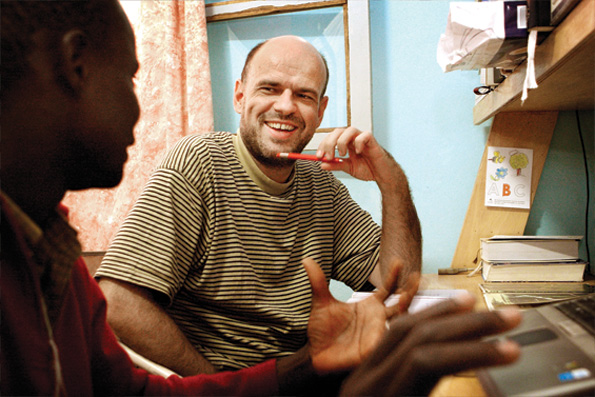
Christoph Haerter is working on a Bible translation in Senegal, one of 100 translations currently underway by NTM translators.
Christoph Haerter is working on a Bible translation in Senegal, one of 100 translations currently underway by NTM translators.
Goal: A translation that transforms lives
When God’s heart has been effectively communicated in a way that can be understood, one of the greatest blessings of all is witnessing change.
“It was one of the sweetest treats of my life to watch new readers hear the scripture, watch them react with true emotion to the story, and later to be forever altered by what the scriptures were saying to them,” said Brooks.
One missionary will never forget the day a tribal man walked up and stated, “I went to the jungle by myself today.”
That simple remark represented a huge shift in worldview.
The villagers had been taught since childhood that it was dangerous, even for grown men, to enter the jungle alone. The spirits lingered there. The spirits could kill. And that fear held them in bondage. But this new believer had defied the spirits. He had gone into the jungle alone — and returned unharmed. He had dared to believe that God was stronger than the spirits. He had dared to trust God.
The goal was a translation that would powerfully transform Yembiyembi hearts and lives.
But that would require more than just handing them a Bible.
Goal: A translation that disciples treasure and apply
Matthew 28:19-20 says, “Go therefore and make disciples of all the nations … teaching them to observe all things that I have commanded you …”
Lasting change involves not only a Bible, but equipping people to value, study and use it. In other words, making disciples. One of the profound perks of translating with NTM is being able to entrust years of hard work to faithful disciples who believe it’s the truth and act on it. Like inhaling and exhaling, the combination ensures the church’s growth and maturity long after the missionaries are gone.
When the Busers left for a nine-month home assignment, the Yembiyembi church had the opportunity to prove how they would cope when left with only God’s Word in their language.
Would they revert back to the old nightmare or stand on the truth?
When animistic beliefs began to re-surface in the village and believers were tempted to fall away, the little tribal church rose up and spoke up. One of the Yembiyembi teachers coined the expression, “I am of the line of Berea.”
Others picked up the mantra and it is still held today.
In the book of Acts, the people of Berea examined Scripture daily to see if what Paul and Silas were preaching was the truth. When left to itself, the little tribal church was aligning itself with Scripture as well.
In the words of the Yembiyembi believers, they had chosen the Bible as their “steer”: the paddle in the back of the canoe that determines direction. They were trusting God’s Word to lead them straight.
The goal was to leave trained disciples and a Bible they knew how to use — and wanted to. Brooks and his teammates met their goals. The animistic nightmare had been silenced. The Yembiyembi church was wide awake and worshipping.
Brooks and Nina Buser at the Bible dedication.
How big is your dream?
Is your current job as big as the one that may be waiting for you? Brooks Buser is thankful he reached for more — more than he even realized.
In translator Terry Reed’s words, “There is no job in the world that you can do that will have a more lasting and eternal value than to take the words of the Almighty God and put them in the hands of a people that have thus far never heard God’s Word in their language. However, be warned: when you have tasted God’s goodness in bringing light into the hearts of a people that have lived in darkness for ages, no other job you can do will ever feel big enough again.”
Tim Shontere still holds the standing record for fastest culture and language acquisition for the field of Papua New Guinea.
A huge job with huge rewards
Now there’s a different story heard around Yembiyembi fires.
“What an unspeakable joy to leave a corner of the village at night,” said Brooks, “and walk by some houses on my way home and hear people reading out loud passages from Romans, 1 Corinthians, Galatians, and the Yembiyembis’ favorite, Acts.”
If we don’t know there is something higher to reach for, we may never look up. Brooks Buser — and a host of other translators — looked up from their everyday lives. And when they did, they saw a dream much bigger than they ever could have imagined.
You can too. Shift your gaze.


